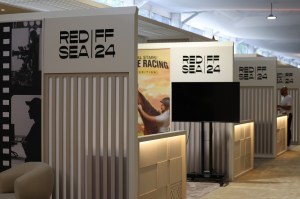The media spotlight may have been on the raft of Hollywood A-listers hitting the fourth edition of Saudi Arabia’s Red Sea Film Festival in th
The media spotlight may have been on the raft of Hollywood A-listers hitting the fourth edition of Saudi Arabia’s Red Sea Film Festival in the port city of Jeddah over these past 10 days, but what was happening in the backdrop at its market was no less remarkable.
Like the rest of the festival, the Red Sea Souk market returned to Jeddah’s historic quarter of Al-Balad, taking up residence in a immense momentary exhibition space.
Running from December 7 to 11 – exactly seven years to the week that Saudi Arabia announced to the outside world in 2017 that it was lifting its 35-year cinema ban as part of a plan to open up the country and its economy – the market’s fourth edition was its busiest to date.
Draws are the country’s $1B box office; its hunger for expertise as it builds a film industry from scratch, the 40% film production cash rebate and its emerging talent pool, as well as the opportunity for some to squeeze in a trip to modern studio spaces in places such as AlUla and Neom.
While the air-conditioning may not have been as effective as that of Jeddah’s swanky Ritz Carlton, which was been the festival and market’s home for the previous two years, the return to Al-Balad made for a far buzzier market atmosphere after the bubble of the hotel.
The market’s modern iteration in Al-Balad was also a far cry from its inaugural edition in 2021, which hosted 19 exhibitors – 11 of them Saudi Arabian – in two petite makeshift halls entered via one of Jeddah’s restored ancient city gates.
International guests were also sparse that year due to a combination of continuing reservations about doing business with Saudi Arabia over its human rights record and a fresh Covid-19 wave, linked to the Omicron variant.
Fast forward three years, and the souk hosted 142 exhibitors from 32 countries, and welcomed 1,730 souk delegates, out of 7,000 overall festival accreditations, this year
Red Sea Souk
Getty Images
“We had 66 exhibitors last year, so we’ve more than doubled the number,” commented Red Sea Souk director, Holly Daniel. “It’s definitely adding legs each year.”
The majority of the exhibitors were from Saudi and the Middle East, but international attendees from outside the region were also on the rise, with the market hosting pavilions for France, Thailand, Africa, India and Turkey as well as the Only From New Zealand booth.
The latter was representing 10 New Zealand companies and bodies including games studios PikPok and Beyond as well as animation and VFX house Floating Rock Studio and bodies such as Screen Wellington.
“It’s been a fantastic foray into this market. There’s a lot of excitement here, a lot of ambition and a lot of desire to partner,” Only From New Zealand’s Creative Business Strategist Louisa Rodani told Deadline.
“We are just so surprised at how welcome we’ve been made to feel here by people at all levels of society. There seems to a huge amount of passion for the changes that are going on here. There’s a real excitement about developing the entertainment and tourism sector.”
Beyond the good vibes, Rodani was also looking for potential business opportunities, and held multiple meetings across the week with potential future partners.
“They’re very upfront about saying we don’t have the capability, we don’t have the expertise but we’ve got the money,” she said.
“They’re being quite blunt about it and it represents an opportunity,” she continues. “We have a lot of legacy of capability in film, games and content creation but may have not as much of the economy and investment that boosts it, so we have to come over here to partner. We’re happy to share knowledge transfer and to collaborate, to tap into some of their support they might provide.”
In a sign of the growing synergies in the region, Egyptian companies were out in force with companies such as Mad Solutions, Lagoonie Film Production, BigBang Studios and Film Clinic taking stands, while Qatar was officially represented in the market for the first time by Katara Studios, which used Red Sea as a platform to unveil a slate of four feature films.
There was also a greater Asian presence thanks to the Red Sea Film Foundation’s extension of its geographical remit to include Asia in its programs. The move means films from Asia are now eligible for the main competition, while its talents can participate in the year-round Red Sea Lab and Red Sea Souk project market.
“We’ve opened up a lot of our opportunities this year to the whole of Asia, such as the project market, so we’re hoping to see much wider Asian representation from outside the Middle East,” said Daniel.
Beyond the market space, this edition saw a number of international industry heavy-hitters touching down in Jeddah for the first time.
They included FilmNation Entertainment CEO Glen Basner, Anonymous Content President of International David Davoli, Kinetic Energy Entertainment CEO Diana Williams and Korea’s Jeongin Hong, CEO of Plus M Entertainment to name but a few.
Basner told an industry panel his reasons for attending were two-fold
“One, it’s a place to really learn how to come make a film here, what the matches are and why it is financially attractive, because it’s probably not for every single type of film,” he said.
“And secondly… to get a sense of the burgeoning talent that’s here in the region. Just walking around the souk today looking at all the promos and videos, I’m walking away and I feel really excited about what’s happening here from a creative filmmaking perspective as well.”

COMMENTS